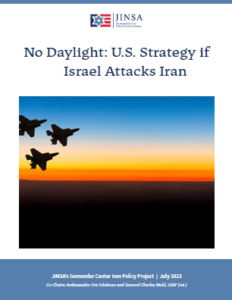No Daylight: U.S. Strategy if Israel Attacks Iran
As Iran’s nuclear program advances and U.S. Iran policy falters, the United States – executive and legislative branches alike – should immediately begin preparing to blunt Iranian retaliation in the likelihood that, absent possible American intervention, Israel acts militarily to stop Iran from crossing the nuclear threshold.
If Israel is forced to take matters into its own hands, it will be fulfilling enduring bipartisan U.S. policy to prevent a nuclear Iran. American officials might disapprove, or even resent, such Israeli action, believing, erroneously, that containing a nuclear Iran is preferable to the risks of preventing it militarily. Should Israel act, however, such concerns should be laid aside.
In the immediate aftermath of an Israeli strike, the interests of the United States and Israel will be aligned. Both countries will be best served by close cooperation to ensure a less bloody, narrower, and shorter conflict. To achieve that goal, American policymakers must start preparing now.
U.S. policymakers should be guided by the basic principle of demonstrating no daylight between America and Israel. Immediate and unwavering U.S. support for Israel on the day of a strike and strong pressure on Tehran and its proxies, especially Hezbollah, in the days after holds out the best prospect of mitigating inevitable Iran-led retaliation. The United States should follow the president’s own words about countering Iran’s nuclear weapons program, as emphasized by the U.S. ambassador to Israel earlier this year: “Israel can and should do whatever they need to deal with it and we’ve got their back.”
Iran Policy Project Co-Chairmen
Ambassador Eric Edelman
Former Under Secretary of Defense for Policy
GEN Charles Wald, USAF (ret.)
Former Deputy Commander of United States European Command
Iran Policy Project Members
Elliott Abrams
Senior Fellow for Middle Eastern Studies, Council on Foreign Relations
VADM John Bird, USN (ret.)
Former Commander, U.S. Seventh Fleet
Gen James Conway, USMC (ret.)
Former Commandant of the Marine Corps
Lt Gen David Deptula, USAF (ret.)
Former Deputy Chief of Staff for Intelligence, Surveillance and Reconnaissance, U.S. Air Force Headquarters
Larry Goldstein
Founder and Director of Energy Policy Research Foundation, Inc.
Lt Gen Henry Obering, USAF (ret.)
Former Director of the Missile Defense Agency
Steve Rademaker
Former Assistant Secretary of State for Arms Control and Nonproliferation
Maj Gen Lawrence Stutzriem, USAF (ret.)
Former Director, Plans, Policy and Strategy at North American Aerospace Defense Command
Ray Takeyh
Senior Fellow for Middle Eastern Studies, Council on Foreign Relations
Roger Zakheim
Former General Counsel and Deputy Staff Director of U.S. House Armed Services Committee
– Iran Policy Project –
The JINSA Gemunder Center’s revamped Iran Policy Project brings together former senior military officers, high-ranking government officials, energy experts and business leaders to address the pressing challenges to U.S. national security posed by Iran and the Joint Comprehensive Plan of Action (JCPOA) on Iran’s nuclear program.
